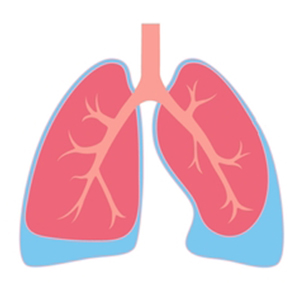Pleural effusion is a medical condition where excess fluid accumulates in the space between the lungs and the chest wall, called the pleural cavity. This can occur due to various reasons, such as infection, inflammation, or cancer. The fluid can be a clear liquid or a cloudy one that contains pus and other substances. Symptoms of pleural effusion may include shortness of breath, chest pain, coughing, and fatigue. If left untreated, the fluid can compress the lungs and prevent them from expanding properly, leading to respiratory failure. Pleural effusion can be caused by various conditions, including pneumonia, lung cancer, tuberculosis, and rheumatoid arthritis. Diagnosis is typically made through imaging tests such as chest X-ray or CT scan. Treatment options may include drainage of the fluid through a needle or surgical procedure, antibiotics for infection, and corticosteroids to reduce inflammation. In some cases, the underlying cause may need to be treated to prevent further complications needing treatment in Pleural effusion Hospital in Vijayawada.
Symptoms:
- Chest pain or discomfort that worsens with deep breathing or coughing
- Shortness of breath or difficulty breathing
- Coughing
- Fatigue or feeling weak
- Nausea and vomiting
- Sharp pains in the chest that may be worse on one side
- Mild fever or chills
- Coughing up blood or rust-colored sputum
- Difficulty breathing or shortness of breath at rest
- Chest tightness or pressure
- Wheezing or crackling sounds when breathing
- Fever over 100.4°F (38°C)
- Confusion or disorientation
If left untreated, pleural effusion can lead to serious complications, such as respiratory failure. It is essential to seek medical attention if you experience any of these symptoms to receive prompt diagnosis and treatment by Pleural effusion doctor in Vijayawada.

Risk factors:
- Age: Older adults are more likely to develop pleural effusion due to age-related changes in the lungs and chest cavity.
- Chronic lung disease: Conditions such as chronic obstructive pulmonary disease (COPD), emphysema, and bronchiectasis increase the risk of pleural effusion.
- Heart failure: Fluid buildup in the lungs due to heart failure can lead to pleural effusion.
- Cancer: Malignant tumors, such as lung, breast, and lymphoma, can spread to the pleura and cause fluid accumulation.
- Infections: Bacterial, fungal, and viral infections, such as pneumonia and tuberculosis, can cause pleural effusion.
- Kidney disease: Chronic kidney disease and end-stage renal disease increase the risk of pleural effusion.
- Autoimmune disorders: Conditions such as rheumatoid arthritis, lupus, and scleroderma can cause pleural effusion.
Understanding these risk factors can help Pleural effusion specialist in Vijayawada diagnose and manage pleural effusion more effectively.
Preventive tips:
- Maintain a healthy weight
- Avoid smoking
- Manage chronic conditions: Individuals with chronic conditions such as heart failure, liver disease, or kidney disease should work closely with their healthcare providers to manage their conditions and reduce the risk of developing pleural effusion.
- Get vaccinated: Vaccination against certain diseases such as pneumonia and influenza can help prevent complications that can lead to pleural effusion.
- Practice good hygiene: Avoid close contact with people who have infectious diseases, and practice good hygiene to prevent the spread of infection.
Consult leading Chest Specialist in Vijayawada, Dr Sri Teja Bollu at one of the best Pulmonology Hospital in Vijayawada for more on Pleural effusion treatment in Vijayawada
Newsletter
Subscribe our Newsletter to get new updates
